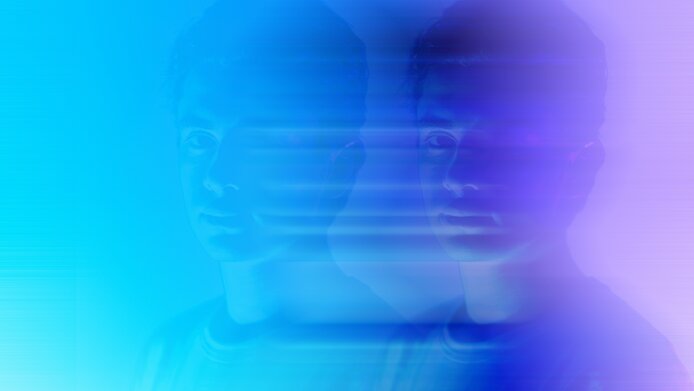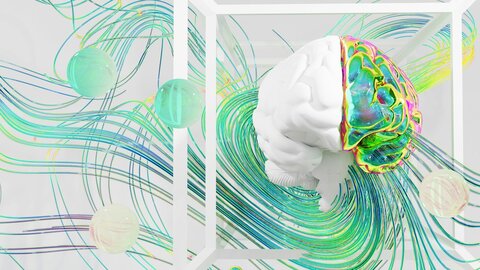The quiet face of schizophrenia

Close to one percent of the human population will experience a schizophrenia-related episode in the course of their life. Their suffering and stigmatization are exacerbated by a shortened life expectancy (by 15 to 20 years), higher suicide rates, and an increased risk for cardiovascular diseases as patients with schizophrenia tend to be medically underserved.
“In recent years, the public has become more aware and also more accepting of psychiatric disorders. But unfortunately, that’s not the case for schizophrenia, even though the data on the underlying neurochemical changes are far more conclusive than for depression, to name an example,” says Matthäus Willeit, who heads a research group at the Department of Psychiatry and Psychotherapy at the Medical University of Vienna. In an innovative approach, Willeit is investigating potential uses of the drug ketamine for alleviating certain schizophrenia symptoms.
The project
Ketamine works directly on the dopamine system to produce a reliable and rapid antidepressant effect and has been used to treat depression since 2019. Neuroscientists at the Medical University of Vienna hope that the drug could also be effective against severe symptoms of schizophrenia, as initial case studies suggest.
Beyond the stereotypes associated with schizophrenia
Willeit focuses on the so-called negative symptoms, which take a toll on patients’ emotions and social interactions. “When we hear schizophrenia, we think of delusions, hallucinations, and impaired sensory perception,” says Willeit. These positive symptoms usually respond well to treatment. “But many people are not aware that there are also negative symptoms. And these often persist even after acute psychotic symptoms subside.”
People suffering from such symptoms tend to isolate themselves, talk less, and have a more shallow emotional perception of the world and flat affect. “In a way, their communication runs dry,” Willeit explains. Studies show that many people with schizophrenia and their loved ones find these symptoms more difficult to deal with than an acute psychosis.
In a project funded by the Austrian Science Fund (FWF), Willeit is looking into the effect of ketamine on this particular group of symptoms. Ketamine is most commonly used as an analgesic and anesthetic. For a long time, it was mistakenly believed to trigger psychoses, which is why physicians categorically ruled out its use on psychiatric patients. In reality, these misconceptions were due to imprecise descriptions of the psychopathology, Willeit explains.
Researching ketamine in a pilot study
Ketamine influences the regulation of the dopamine system and can amplify dopaminergic signals in the brain. In 2019, it was approved as a drug for treatment-resistant depression. Previous studies by researchers from Willeit’s team suggest that it could be useful for relieving the negative symptoms of schizophrenia as well.
“In an earlier study, which was also funded by the FWF, we were able to show that the negative symptoms of schizophrenia are caused by a relative dopamine deficiency as opposed to the acute psychotic phase of schizophrenia, which is caused by excessive dopamine activity,” Willeit explains. His research team is now building on this insight.
In their current research project titled “Ketamine for negative symptoms of schizophrenia,” Willeit and his team are testing the effectiveness of the substance on 20 patients who suffer from schizophrenia or a schizoaffective disorder. In two treatment phases, the study participants take both ketamine and placebos. The researchers cooperate with Gregor Kasprian, Director of Neuroradiology at the Medical University of Vienna, to gauge through magnetic resonance imaging how the ketamine treatment affects the structure and functioning of the brain.
“We have already published several case studies about this treatment approach. In this pilot study, we want to gain insights regarding its effectiveness,” Willeit explains, emphasizing that the team needs proof of the effectiveness before proceeding with large clinical studies. The researchers expect to see the first results in the next months. But Willeit says that their observations to date already indicate that the old worry about ketamine causing psychoses is unfounded.
Closing treatment gaps
Many people with schizophrenia do not receive adequate medical treatment even though therapeutic options are available today. “There are estimates that up to two thirds of people with schizophrenia around the world do not get the right treatment,” Willeit says. There are many reasons for that: stigmatization, poor access to health services, and the disease itself, which makes it difficult for those affected to stick to a treatment regime. Willeit emphasizes that institutions such as the City of Vienna’s Psychosocial Services are extremely valuable partners as they offer services close to where the patients live.
Dr. Willeit has a clear goal: “The project will be a success if we manage to reduce the time span until the negative symptoms disappear. Of course, there is no magic pill that people take and then find themselves cured overnight. But in addition to psychotherapeutic measures, the support of outpatient services, and targeted programs, therapies involving ketamine could help people with schizophrenia find their way back to life.”
About Matthäus Willeit
Matthäus Willeit heads a research group at the Department of Psychiatry and Psychotherapy at the Medical University of Vienna. Trained as a physician, he now investigates how schizophrenia and other disorders with psychotic symptoms develop and how they can be treated, with a focus on changes in the dopamine system. The clinical research project “Ketamine for negative symptoms of schizophrenia” has received funding by the Austrian Science Fund (FWF) in the amount of about EUR 404,000.
Publications
Amphetamine-Induced Dopamine Release Predicts 1-Year Outcome in First-Episode Psychosis: A Naturalistic Observation, in: Schizophrenia Bulletin 2025
On the relationship of first-episode psychosis to the amphetamine-sensitized state: a dopamine D2/3 receptor agonist radioligand study, in: Translational Psychiatry 2020





